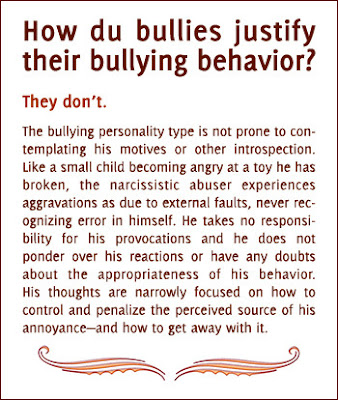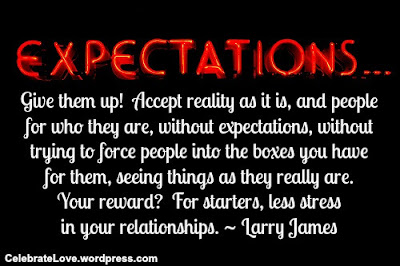Can we strive to be more specific in our use of words is
always something that I face with my daily reflections.
For example,"Toxic" is often used as such a broad umbrella term and under
such an umbrella all kinds of petty acts are relegated to equal intensity. Under this category truly hurtful and abusive
actions become the equal of unintentional comments or actions that are
perceived to be hurtful.
For example if I make a comment and someone's feelings are
hurt by that comment does that make me toxic, my comment toxic or does the
person hearing my comment have an interpretation problem because of their personal issues from their life experiences?
Further if they label me as toxic and walk
away, can I learn from the experience?
Is there possibility for growth, for communication, for boundary work,
for understanding? NO, because labeling and
silence is an end to communication, an end to working on resolving, an ending
rather than a beginning.
Expand that to our estranging adult offspring. If the things we did as parents came from a
good place at heart, does their perception of us as toxic come from our
behaviour or from their interpretation or perception of our behaviour?
Tossing labeling words around to explain responses and
reactions, could this be a sign of our times where we are not willing to invest
ourselves in communication? Have we
begun to make ourselves unavailable to discuss these important inter-relationships
issues without generalizations?
If our offspring could say to us "when you say XXX I
feel YYY" that would open the door to communication. Instead they choose to abstain from
communication by saying "you are toxic and I will not be around you",
thus cutting of communication and possible solutions.
I am unsure as to how much of this is a sign of our times
where communication has to be “text-able”.
You are toxic can be texted in a moment of anger. Talking about feelings and responses requires
at the very least full sentences and thoughtful reflections, listening skills
as well as managing responses that come from a place of hurt or anger.
If in the process of grieving our hurt and our loss, we then
fall into the same category as our offspring by emulating their behaviour are
we doing anything to further the cause of communication or are we further
compounding the problem?
For this reason I am starting to think in terms of
"actions" and "words" that are much more specific.
We can agree that the way our offspring treat us is
wrong. But to lump them all together as
being toxic I believe is also wrong. Is it
not better to be specific?
For example: I could say "My estranging daughter's behaviour is toxic and therefore I
will be angry with her for being so mean to me and I will label her as a bad
toxic person so that I don't have to face the pain."
or
I could be more specific and say "when my daughter chooses to withhold
communications with me, when she gives me the silent treatment I am hurt. My feelings are unacknowledged by her. My importance has been diminished by
her. Her behaviour toward me is wrong
because it removes the possibility for resolution from the equation. Her
actions hurt me because I feel rejected which triggers my attachment
needs. I feel unworthy because she
triggers my guilt feelings. How I
respond to her actions is based on my emotional needs being unmet."
This then allows me to look at what is it about me that
allows me to be triggered in this way. If I look at myself and why I react this way, is this not an opportunity for me to grow and
learn? I can now see her actions
separate from how they make me feel. I
can allow for the possibility that she is not deliberately mean or spiteful
or toxic, but that her actions are based on her own hurting.
Now I further try to imagine if our offspring did the same thing.
What if instead of pointing a finger of blame at us and
labeling us as toxic, they were to look at what it is inside themselves that
makes them respond the way they do?
And here is where I think that media has let us down. In generalizing behaviours as toxic they
simplify to a place of non-growth, to a place of externalizing, and for making excuses.
Our young people have taken this to mean that
any time your feelings are hurt blame the other person for being toxic. Take the easy way out. Don’t work on relationships, excise
them. And this works because all actions
that make us feel uncomfortable are now under one big umbrella word
“toxic”. But really isn’t emotional
discomfort a warning sign that there is something that needs addressing?
If I hear a suggestion as a put down does
that mean the suggestion or the suggestor have evil intentions or is the
problem with my own insecurities?
Growth happens when we explore the reasons for our reactions
when we can vocalize our reactions coherently and communicate effectively. Through non-confrontational communication we
open pathways for learning and change.
Of course this will not stop people who willfully say or do
hurtful things, (and I am not saying that such people don’t exist), but I do
believe most people don't do negative things willfully. For most people saying hurtful things is a
reaction to a fundamental insecurity within themselves, in other words, they
lash out from a place of hurt. However
inflicting another hurt does not expunge the original hurt. And returning another hurt for the previous
hurt only exacerbates the problem.
So if we see our offspring responding in a hostile manner
toward us for something we unintentionally are perceived as having done to them
we need to step back and say they are acting out of hurt not because they are
willfully being toxic.
We can in effect
end the cycle.
Let them hold the grudge
and the anger until they grow and learn to express their emotions with the
intention of resolution. We do not have
to step up the rift by resorting to the same tactic of name calling.
I have no doubt there is a tendency for us to do this name calling thing. If we can label their behaviour as
sociopathic or narcissistic or toxic or any of the other catch phrases that go
around today, we can relegate the estrangement to a character flaw in our
offspring and protect our hurt feelings by putting up another barrier. If we respond to their hurt which was
displayed as a hurting action towards us (estrangement), with a desire to hurt
them back by labeling their behaviour have we then not lowered ourselves?
I am fighting this all the time myself. It is so easy to label my estranging daughter
as cruel or spiteful. But then I become
just like her, lowering myself to name calling. Do I want to walk that path? Not really.
Does it help to know that there is possibly something much deeper at work
that causes her to behave the way she does?
Yes. But does labeling or name
calling make me a better person or improve the situation? Most
assuredly not.
So what should my course of action be if I want to elevate
myself, to become the best person I can be?
- I should strive to raise myself above this pettiness of name calling.
- I should focus on healing the triggers that cause me to see her actions as especially hurtful.
- I should leave the door open that someday she too may learn that name calling and emotional silence is not the way forward.
The questions becomes:
- what kind of person do I want to be and can I grow into that vision of myself?
- Can I elevate myself to maintain an open mind in the spirit of loving, compassion and forgiveness?
This is my goal, to release the need to retaliate, to remove
the need to blame, and release the unworthiness of payback.
I am learning that the harder path seems to be, for me, the correct one. In facing this I acknowledge that to strive to be a better person I must choose my reactions carefully and that this journey will not always be an easy one.
I am learning that the harder path seems to be, for me, the correct one. In facing this I acknowledge that to strive to be a better person I must choose my reactions carefully and that this journey will not always be an easy one.
Renate Dundys Marrello
2015 - 10 - 29
Photo credits: as marked or unknown
My journal blog entries are copyright
I love when you share my page to
spread the word.
If you want to quote me I kindly
ask that you please provide a link back to my page.






















